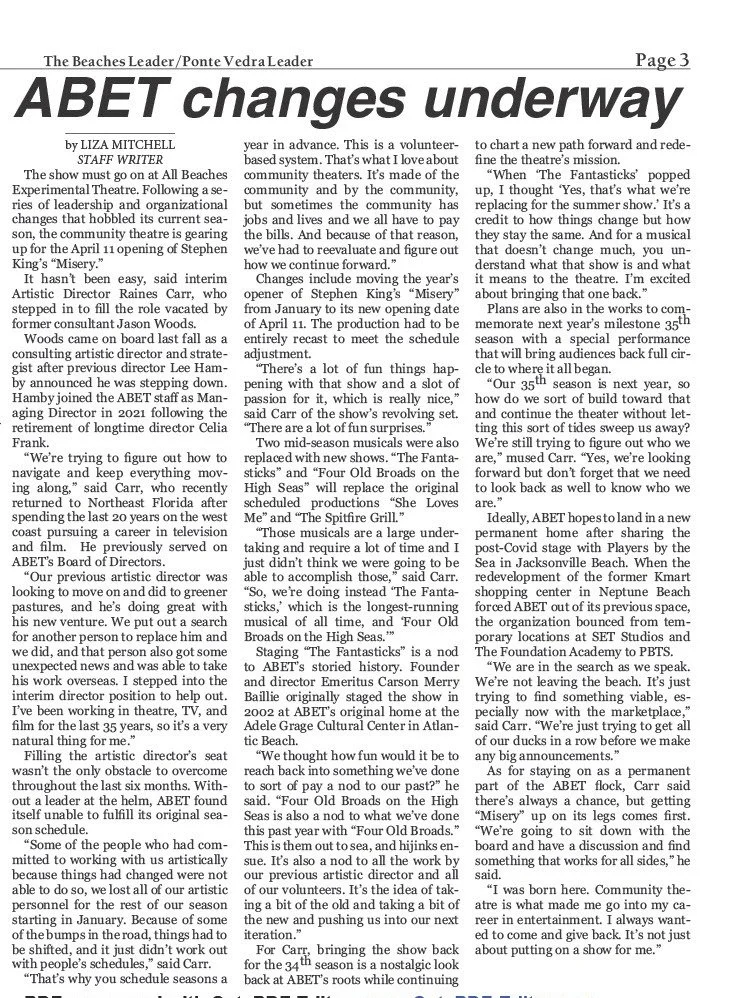Recent Productions /
The Bard Bus Season 3 Coming in late June 2020! /
/
Upcoming Projects for 2020 /
A new play coming soon to Apex Theatre Studio! /
Directed by Raines Carr
Lime & Limpid Green /
Top Row, L to R: Chandler Bryant as Oberon & Jessica Brock as Titania Bottom Row, L to R: Salka Corring as Moth & Leila Warren as Mustardseed
The Bard Bus hits the road with William Shakespeare’s most visionary play.
story by GEORGIO VALENTINO
“Lord, what fools these mortals be!” So says the mischievous sprite Puck, in William Shakespeare’s A Midsummer Night’s Dream.Raines Carr, associate director of Ponte Vedra’s Apex Theatre Studio, tends to agree. Carr is directing a contemporary adaptation of the play, which follows a fugitive Athenian couple as they flee into a forest realm ruled by the fairy King Oberon. Lines like this keep the whimsical, woodland comedy relevant more than 400 years after its Elizabethan premiere.
“Shakespeare is more relevant today than ever,” Carr told Folio Weekly. “He’s been described as the most human human. The things he writes in this play in particular—women trying to find their autonomy in a world defined by men—if that’s not 2019, I don’t know what is.”
There’s another reason why this play is timeless: The Bard of Avon’s psychedelic masterpiece was never really of its time from the start. A Midsummer Night’s Dream is ostensibly set in classical Greece, a couple of millennia before Shakespeare put quill to parchment in 16th-century London, and the action unfolds in the verdant ether of Oberon’s forest, the unknown, the subconscious. Anticipating Friedrich Nietzsche and Syd Barrett, Shakespeare suggested that a rich, Dionysian green was the necessary complement to austere Apollonian blue.
“The play is not really set anywhere,” Carr explained. “It’s just a dream world. It takes place in the forest at night because that’s when these crazy dreams happen, and the play is about those dreams and the things that flood into our minds and create fantasies. So there are contemporary objects along with all these fairies and characters from ancient Athens.”
The production is part of Apex Theatre Studio’s now-annual Bard Bus program, launched last year to kill two birds with one stone. It’s a summertime exchange between Apex and schools across the nation, but it’s also an excuse to tour Shakespeare across Florida off-season. After its premiere run at The Amp in St. Augustine, Carr takes the Bard Bus and A Midsummer Night’s Dream to Jacksonville, Atlantic Beach and Brunswick, Georgia.
The play’s principal characters are performed by visiting young artists, student actors brought in from universities across the country. Many of these players have Northeast Florida roots, like Chandler Bryant (Oberon), a Douglas Anderson School of the Arts graduate who now studies acting at the University of North Carolina.
The supporting cast comprises advanced Apex students, local youths between 10 and 16 years old. It’s a mutually beneficial relationship; the visiting artists get to work during the summer doldrums, and the apprentices observe and participate.
“It lets our students interact with older, professionally minded actors who are going places,” Carr said. “They’re there to listen, learn, discover the work ethic and see what it takes to be an actor at a different level.”
The arrangement is in keeping with the organization’s mission. Apex Theatre Studio isn’t your traditional theatre company; it’s a youth theater laboratory founded in 2013 by Jacksonville-based theater-maker Ian Mairs to supplement the dwindling artistic programs offered at under-resourced Florida schools.
Carr joined up a couple of years ago. After studying in Alabama and working in Los Angeles, Carr returned to his native Jacksonville and contacted Mairs.
“I used to go see Ian’s plays when I was a teenager in [Jacksonville],” Carr recalled. “He and Michael Emerson would do shows together. They were my idols when I was a teenager. We worked together on one of his plays in college. Twenty years later, I called and told him I was moving back to the area, if he needed any help.”
Among his other duties, Carr helped launched Bard Bus last summer with a production of As You Like It. He and Mairs decided to follow up with another comedy before delving into Shakespeare’s brutal tragedies (King Lear might be coming this winter). Carr trimmed the play’s usual two-and-a-half-hour running time down to 80 minutes. The performance is preceded by a set of live music by a different local band each night. The drama itself is accompanied by a live soundtrack.
“It’s really fast-paced,” Carr said, “and really funny. Everyone tends to think of Shakespeare as this highfalutin’ playwright, but he wrote to the lowest common denominator as well. Once you figure out what the characters are saying, you’re thinking, ‘This is so naughty and so funny!’”











